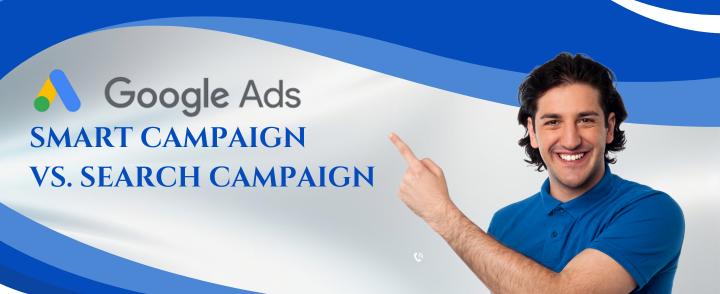Google Ads has revolutionized the digital advertising space, providing businesses with various options to reach their target audience. Among these, Smart Campaigns and Search Campaigns are two of the most popular choices. While both serve unique purposes, choosing the right one can significantly impact your ad performance. helping you make an informed decision.
Understanding Smart Campaigns
Smart Campaigns are designed for ease of use, making them ideal for small businesses or those new to Google Ads. They leverage Google’s machine learning to automate ad placement, targeting, and bidding strategies.
Pros of Smart Campaigns:
- Automation – Google’s AI handles most of the heavy lifting, including keyword selection and bidding.
- Time-Saving – Minimal manual optimization is needed, making it a good fit for beginners.
- Multi-Channel Reach – Ads appear across Google Search, Display Network, YouTube, and Google Maps.
- Budget-Friendly – Designed for cost-effective results by maximizing conversions within the set budget.
Cons of Smart Campaigns:
- Limited Control – Advertisers cannot manually select keywords, placements, or bidding strategies.
- Lack of Detailed Reporting – Smart Campaigns provide minimal data insights compared to Search Campaigns.
- Less Optimization Flexibility – Since everything is automated, testing and tweaking ad performance is restricted.
Understanding Search Campaigns
Search Campaigns, on the other hand, offer advertisers complete control over their targeting, ad copy, and bidding strategy. These campaigns appear in Google’s search results when users type in relevant queries.
Pros of Search Campaigns:
- Manual Keyword Selection – Advertisers can target specific, high-intent keywords.
- Better Customization – Full control over ad copy, ad extensions, and landing pages.
- Detailed Analytics – Provides insights into competitor keywords, ad performance, and audience behavior.
- Higher Conversion Rates – Ads target users actively searching for specific products or services.
Cons of Search Campaigns:
- Requires Expertise – Unlike Smart Campaigns, manual optimization is necessary for maximum results.
- Time-Consuming – Needs continuous monitoring, A/B testing, and bid adjustments.
- Potentially Higher Costs – If not managed well, CPC (cost-per-click) can increase significantly.
Key Differences Between Smart and Search Campaigns
Smart Campaigns are easier to set up and use, making them ideal for small businesses and beginners. Google automates the entire process, from keyword selection to bidding, ensuring a hassle-free experience. However, this automation limits control over targeting and performance optimization.
Search Campaigns, on the other hand, offer complete control, allowing advertisers to choose specific keywords, adjust bids, and analyze data for continuous improvement. While they require more expertise and effort, they provide better transparency, customization, and higher conversion potential.
Performance Marketing and Campaign Selection
Performance Marketing plays a crucial role in optimizing advertising campaigns for maximum returns. Whether using Smart Campaigns or Search Campaigns, businesses should focus on measurable results and data-driven decisions. Smart Campaigns are great for businesses looking for automated solutions, while Search Campaigns provide more granular control and optimization opportunities.
Google Ads for Educational Institutes, Coaching Centers, and Trainers
Educational businesses can benefit greatly from Google Ads by targeting students and parents searching for courses.
Smart Campaigns for Educational Businesses:
- Local Targeting – Ideal for coaching centers attracting students in a specific area.
- Automated Ad Creation – Google generates ads based on business details.
- Multi-Platform Presence – Appear on YouTube, Google Maps, and the Display Network.
- Budget Optimization – Runs efficiently without manual bidding.
Search Campaigns for Educational Businesses:
- Targeted Keywords – Advertise for terms like “best coaching for NEET” or “spoken English classes.”
- Ad Extensions – Use call extensions, site links, and snippets to showcase courses.
- Landing Page Optimization – Drive potential students to dedicated course pages.
- Remarketing – Retarget visitors who showed interest but didn’t enroll.
Which One Should You Choose?
Smart Campaigns Are Best If:
- You prefer an automated approach.
- You run a small or local educational business.
- You lack time for manual campaign management.
- You want AI-driven optimization with minimal customization.
Search Campaigns Are Best If::
- You need full control over keywords, placements, and budget.
- You want detailed performance insights for optimization.
- Your business is in a competitive market where precise targeting matters.
- You have the expertise or resources for campaign management.
Final Thoughts
Both Smart Campaigns and Search Campaigns offer distinct advantages. Smart Campaigns are great for beginners and local businesses that want a hands-off approach. On the other hand, Search Campaigns provide better control and customization, making them ideal for experienced marketers looking for high-performing campaigns.
At Digital Marketing Dharwad, we specialize in helping businesses succeed through tailored digital marketing strategies. As a leading Google Ads agency, our services include Google Ads management, SEO, social media marketing, content marketing, and more. Whether you’re looking for an automated Smart Campaign or a highly targeted Search Campaign, we can help you optimize your advertising efforts for maximum impact.
We take a data-driven approach to ensure that every advertising budget you allocate brings measurable results. Our team of experts continuously monitors and refines campaigns to improve performance and increase ROI.
Visit Digital Marketing Dharwad to learn more about how we can transform your digital marketing efforts and drive your business forward.

